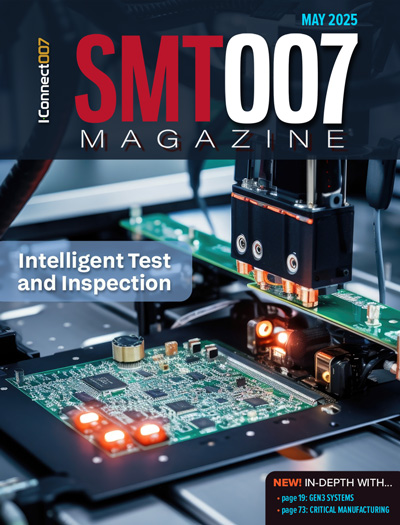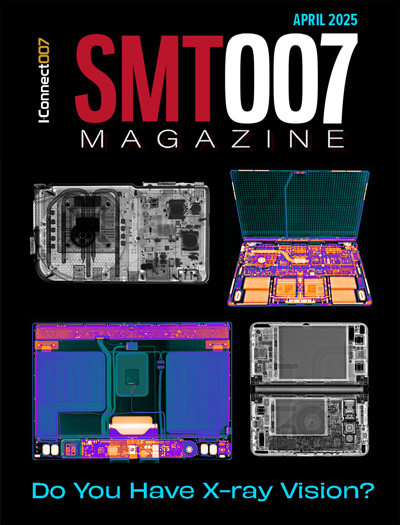-

- News
- Books
Featured Books
- smt007 Magazine
Latest Issues
Current Issue
Moving Forward With Confidence
In this issue, we focus on sales and quoting, workforce training, new IPC leadership in the U.S. and Canada, the effects of tariffs, CFX standards, and much more—all designed to provide perspective as you move through the cloud bank of today's shifting economic market.

Intelligent Test and Inspection
Are you ready to explore the cutting-edge advancements shaping the electronics manufacturing industry? The May 2025 issue of SMT007 Magazine is packed with insights, innovations, and expert perspectives that you won’t want to miss.

Do You Have X-ray Vision?
Has X-ray’s time finally come in electronics manufacturing? Join us in this issue of SMT007 Magazine, where we answer this question and others to bring more efficiency to your bottom line.
- Articles
- Columns
Search Console
- Links
- Media kit
||| MENU - smt007 Magazine
IPC Asia President Phil Carmichael on China Trends
May 1, 2019 | Barry Matties, I-Connect007Estimated reading time: 10 minutes
At the productronica China 2019 show in Shanghai, Barry Matties joined Phil Carmichael, president of IPC Asia, to discuss the continued growth of IPC in Asia, including the increasing emphasis on training. IPC China has grown from hosting two technical conferences five years ago to 32 in the past year. Phil also addresses current trends he’s seeing as well as trade tensions between China and the U.S.
Barry Matties: Welcome, Phil!
Phil Carmichael: It’s always good to see you, Barry. Another year, another show.
Matties: Indeed, but this is a bit of a different venue for the solder competition. It’s the first year of the competition being held at productronica China.
Carmichael: It is. I haven’t seen the audited results yet, but I believe this will be the largest show in the world for our industry. We’re happy to be here, and even though we’re in a tent, it seems like it’s a well-organized tent. It’s just a sign that the show is continuing to expand and it is the premier industry show in China.
Matties: And I think it was a smart move for IPC because this show represents different aspects of the electronics industry, and IPC is well-connected.
Carmichael: You may have seen that we had three of our IPC Global Board of Directors here, both Tom Edman and Cao Xi, who were both speakers at technical events in a separate venue. Bob Neves also introduced the CFX line yesterday, and we had a PCB design seminar as well, so it has been a busy week.
Matties: The growth of IPC in Asia has been phenomenal. I know we’ve talked about this in the past, but is membership now reaching close to one-third of all members?
Carmichael: Yes. We’re just under one-third of the global population by sites, and we’ve been averaging 16–17% CAGR member growth since 2012 when I joined primarily because IPC offers real value to member companies in China. We do high-tech training ourselves, which ensures quality. In a training environment, it’s one thing to look at a screen online and answer a bunch of questions, but what we find for training in China is that every student who comes to participate in a training event has a little card from their boss in their back pocket that says, “Ask this question. You have to figure out what others are doing about this issue.”
And that’s not something you can do on an online program course, so it’s still very popular for us to do online personal training. We will teach approximately 2,500 students this year in China, and they’re all graduate engineers. They come with their questions and want to learn the course as well as more specific knowledge related to their factory or industry.
Matties: There’s a big change going on in China in terms of not just education but also the operators. One of the things I noticed about the show was the level of the robotic booths from automated guided vehicles (AGVs) to other automation taking place.
Carmichael: True, and somebody has to program those and make changes in the business intelligence (BI) sets and everything else. So, yes, robotics and automation are the future, but we still need smart operators in China.
Matties: And that goes to the point of education. The education is raising the skill level in both the process maintenance and operation levels.
Carmichael: From our standpoint, five years ago, we did one or two technical conferences in China. Last year, we did 32 across China, and we’ll do a few more this year. Between the hand-soldering competitions, our accompanying courses, and our technical seminar education program—which brings in speakers from NASA, Boeing, Bosch, Continental, etc. combined with Chinese speakers—we’ll touch several thousand key decision-makers this year, which is a big change from what we used to do.
Matties: What training trends are you seeing here compared to other regions of the world?
Carmichael: A couple of my colleagues back at headquarters determined that online training is slower to be adopted in China than it is in Europe or the U.S. There is an interest for some very repetitive, low-end training, such as ESD, but IPC Greater China customers still prefer material connected to standards, such as IPC-610, IPC-620, or IPC-7711, and classroom-based training.
There also seems to be a correlation to the cost of training versus the delivery platform. So, if it’s a $50 course, people want to do that online. But if it’s a $500–$600 course, they want an instructor and be able to ask questions. This trend is still evident. The number of students that we’ve put through IPC training each year has continued to expand as classroom-based, and we offer seven classrooms in the greater China area that have both soldering stations and classroom teaching.
Matties: One of the things I noticed at the opening ceremony of the CPCA Show this week was the public mention of the trade war and the concerns that people have in China. I know you’ve given this some thought and advised people on how to deal with this. Can you give us an update on what you think?
Carmichael: Certainly, I don’t think this helps either side and as an individual, I would like to see a conclusion sooner rather than later. In business, uncertainty is not good for business. Just look at Brexit; it’s a mess, and it doesn’t look to be resolved soon. We don’t have an end date in sight yet for the current tensions between China and the U.S. I think that both sides are genuine in their beliefs. There are certain things that the U.S would like to see, particularly the protection of intellectual property. And there are certain things the Chinese would like to see, including free access to the U.S. marketplace. So, there are strong feelings on both sides.
I had expected a weaker first quarter in China than has actually occurred, so in spite of the trade tensions, business is still being done, which is positive. We’re not sure yet where the tariffs are going to come out, but people are making things, doing training, and we continue to write new standards. As we say in the U.S., “Knock on wood,” but so far, so good.
The next big thing for us and the industry will be further integration or adaptation of IoT in the form of IPC CFX. We had a well-attended seminar yesterday about it. We’re going to doing an even more advanced CFX production line in Shenzhen in October. We did one there last year, and it was the first of its kind in the world to have a product produced with machines talking to each other with no human intervention. That’s a real game-changer for the industry because it allows the supply chain, factories, and management to talk to each other electronically and come up with a report that people can look at but without standing and looking over a machine.Page 1 of 2
Suggested Items
SolderKing’s Successful Approach to Modern Soldering Needs
06/18/2025 | Nolan Johnson, I-Connect007Chris Ward, co-founder of the family-owned SolderKing, discusses his company's rapid growth and recent recognition with the King’s Award for Enterprise. Chris shares how SolderKing has achieved these award-winning levels of service in such a short timeframe. Their secret? Being flexible in a changing market, technical prowess, and strong customer support.
Preventing Surface Prep Defects and Ensuring Reliability
06/10/2025 | Marcy LaRont, PCB007 MagazineIn printed circuit board (PCB) fabrication, surface preparation is a critical process that ensures strong adhesion, reliable plating, and long-term product performance. Without proper surface treatment, manufacturers may encounter defects such as delamination, poor solder mask adhesion, and plating failures. This article examines key surface preparation techniques, common defects resulting from improper processes, and real-world case studies that illustrate best practices.
Breaking Silos with Intelligence: Connectivity of Component-level Data Across the SMT Line
06/09/2025 | Dr. Eyal Weiss, CybordAs the complexity and demands of electronics manufacturing continue to rise, the smart factory is no longer a distant vision; it has become a necessity. While machine connectivity and line-level data integration have gained traction in recent years, one of the most overlooked opportunities lies in the component itself. Specifically, in the data captured just milliseconds before a component is placed onto the PCB, which often goes unexamined and is permanently lost once reflow begins.
BEST Inc. Introduces StikNPeel Rework Stencil for Fast, Simple and Reliable Solder Paste Printing
06/02/2025 | BEST Inc.BEST Inc., a leader in electronic component rework services, training, and products is pleased to introduce StikNPeel™ rework stencils. This innovative product is designed for printing solder paste for placement of gull wing devices such as quad flat packs (QFPs) or bottom terminated components.
See TopLine’s Next Gen Braided Solder Column Technology at SPACE TECH EXPO 2025
05/28/2025 | TopLineAerospace and Defense applications in demanding environments have a solution now in TopLine’s Braided Solder Columns, which can withstand the rigors of deep space cold and cryogenic environments.


